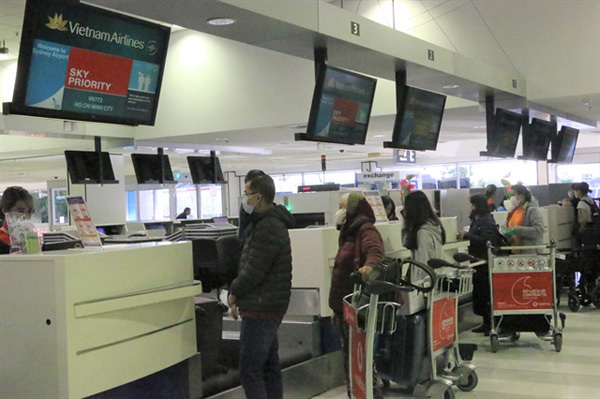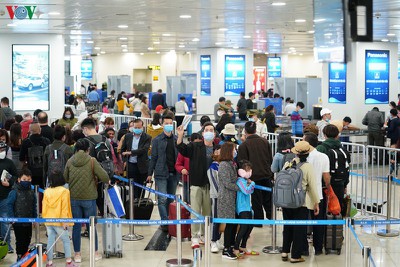 |
| Vietnamese citizens complete check-in procedures at Sydney international airport on July 3 to take a repatriation flight back home. — VNA/VNS Photo Nguyen Minh |
How many flights Vietnam has conducted to bring Vietnamese abroad home to prevent COVID-19?
The Civil Aviation Administration of Vietnam has co-ordinated with airlines to conduct more than 60 flights repatriating nearly 16,000 Vietnamese citizens from almost 50 countries and territories due to the COVID-19 pandemic.
The administration has also collaborated with diplomatic missions to permit domestic and foreign airlines to use cargo flights to bring back 1,255 Vietnamese citizens stranded at international airports and transit points due to travel restrictions.
How has the administration work with other ministries and agencies to arrange such flights?
This is not the first time the aviation sector has carried Vietnamese citizens home following the Government’s directions. But this time the sector has conducted very special flights in a completely new situation. The Vietnamese aviation sector has never carried out flights to as many destinations in the world as it has done over the past months, including destinations it has never flown to before.
To fulfil the mission, agencies have worked closely with each other.
Apart from the efforts of the administration and airlines, Vietnamese embassies, consulates and diplomatic agencies abroad have made efforts and helped ask for permission and deal with procedures to conduct flights from other countries. Also, the Ministry of National Defence’s agencies have worked to welcome flights home and arrange quarantine centres no matter what the time, making a great contribution to the success of flights bringing Vietnamese citizens back home over the past few months.
Tickets for flights repatriating Vietnamese citizens cost more than normal flights. Is the price hike aimed at making up for losses caused by the COVID-19 pandemic to airlines?
All airlines defined that this is a political and humanitarian mission of the aviation sector so profit was not their target. Sales of tickets are based on the list of passengers approved by diplomatic agencies abroad and the prices only make up a part of the direct expenses for conducting the flights, not to mention indirect expenses relating to technical and quarantine requirements.
There are many factors leading to increased expenses for a flight. For example, the number of crew members on a flight repatriating Vietnamese citizens is often double or triple that of a normal flight. All the crew members have to work and take a rest on the plane as they do not enter foreign destinations where they pick up Vietnamese citizens. Upon arrival in Vietnam, they are all put under quarantine for 14 days so they can't join other domestic flights during that time.
We know there are high risks of catching the disease because many flights repatriating Vietnamese citizens from COVID-19 affected areas will have passengers positive for the virus. However, the aviation sector is always ready to fulfil the mission while strictly abiding by safety and security standards of the International Civil Aviation Organisation.
Many Vietnamese people abroad want to return home but have been unable to secure a place on a flight so far. Could you explain more about this?
We still cannot meet all the demand at this time. The demand is huge while the capacity of the aviation sector and quarantine centres is limited. Agencies have to give priority to children under 18, the elderly, pregnant women, people with health problems, workers with expired labour contracts and no accommodation, students without residence due to dormitory disclosure and others in especially difficult circumstances.
Vietnamese diplomatic agencies abroad will continue making lists of citizens wishing to return home to report to the Ministry of Foreign Affairs to work with relevant ministries and agencies to arrange appropriate repatriation flights.
How many repatriation flights will be carried out in the near future? How has the aviation sector prepared if the pandemic lasts longer?
From now to the end of August, the aviation sector will continue working with diplomatic and military agencies to conduct 50 more flights to bring some 13,000 Vietnamese citizens home.
The COVID-19 pandemic is developing complicatedly in the world but the aviation sector has made efforts to resume its operation.
With the domestic flight operations returning to normal like in the period before the pandemic, the aviation sector has built plans on gradually resuming international commercial flights based on the COVID-19 situation in foreign markets.
The plans are based on the principles of selecting destinations which have effectively controlled the pandemic’s spread in the community, keeping flight frequency at a minimum level to meet domestic quarantine capacity and strictly adhering to the pandemic control requirements of health authorities. VNS/SGGP

Vietnamese expatriates proud of their homeland amid COVID-19 pandemic
Despite limited resources, but with strong determination, Vietnam has gradually brought the novel coronavirus epidemic under control. The success story has been shared and admired by many overseas Vietnamese no matter where they live.

Vietnamese citizens stranded abroad to be brought home
The Prime Minister has asked the Ministry of Foreign Affairs to draw up plans to bring home Vietnamese nationals stranded abroad due to the COVID-19 pandemic, with priority given to the elderly, the sick and people under 18.
 Dinh Viet Thang, head of the Civil Aviation Administration of Vietnam, talks about plans to bring more Vietnamese abroad home due to the COVID-19 pandemic.
Dinh Viet Thang, head of the Civil Aviation Administration of Vietnam, talks about plans to bring more Vietnamese abroad home due to the COVID-19 pandemic.